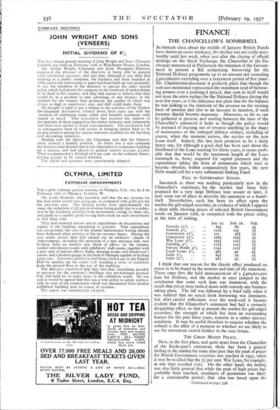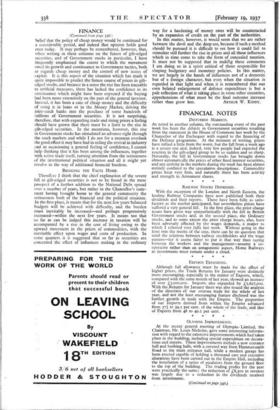THE CHANCELLOR'S BOMBSHELL
FINANCE
ALTHOUGH since about the middle of January British Funds have shown an easier tendency, the decline was not really note- worthy until last week, when just after the closing of official dealings on the Stock Exchange' the Chancellor of the Ex- chequer announced in Parliament the intention of the Govern- ment to present a Bill authorising borrowing for the National Defence programme up to an amount not exceeding L'400,000,000 extending over a maximum period of five years. Mr. Chamberlain also made it perfectly plain that though the sum just mentioned represented the maximum total of borrow- ing powers over a prolonged period, that sum in itself would not meet the extra outlays for the National Defence during the next few years, and the inference was plain that for the balance he was looking-to the elasticity of the revenue on the existing basis of taxation and also to an increase in taxation, if such increase_ should become...necessary. Moreover, so far as can be gathered at present, and reading between the lines of the Chancellor's statement it looks as though the policy would be pursued of meeting out of revenue anything in the shape of maintenance of the enlarged defence outlays, including of course, when the moment arrives, the service on the new Loan itself. Indeed, this last item promises to be a fairly heavy one, for although a good deal has been said about the likelihood of the Loan running for thirty years, it seems prob- able that that would be the maximum length of the Loan inasmuch as, bein3 required for capital purposes and the expenditure taking the form of armaments which tend to become obsolete within comparatively few years, the new Debt would call for a very substantial Sinking Fund.
FALL IN GOVERNMENT STOCKS.
Inasmuch as there was nothing particularly new in the Chancellor's statement, for the market had been fully prepared for a very large Defence loan sooner or later, it may seem out of place to describe the statement as a bomb- shell. Nevertheless, such has been its effect upon the market for gilt-edged securities, in evidence of which I append a short table showing prices of selected British Government stocks on January 12th, as compared with the prices ruling at the time of writing.
20onnssoollss 42cyoi% ....
844 1121 Feb. i6. 8o
109
Fall.
41
31 Conversion 24%
tot
984 21.
Conversion 34%
Jell:ail.
1064 1031 31 War Loan 34%
Io51 1024
31
vFiuctnodryingB4o1 s *Li%
1151 1124 1 lot
31 31 Local Loans 3% .. .964
92
41 India 3% .. • •
841
79 51 India 34% . . . . 984 93 51 I think that one reason for the drastic effect produced on prices is to be found in the manner and time of the statement. There cam: first the bald announcement of a L400,000,000 loan for Defence, and the market at once jumped to the conclusion that some such loan was imminent, with the result that prices were rushed down with scarcely any business taking place. The fall was followed by a brief rally when it was realised that no actual fresh borrowing was imminent, but after careful reflections over the week-end it became evident that the Chancellor's statement had had a seriously disquieting effect, so that at present the market for gilt-edged securities, the strength of which has been an outstanding feature for the past three years, remains in a rather nervous condition. It may be useful therefore to enquire whether the setback is the affair of a moment or whether we are likely to see the movement extend further in the near future.
THE CHEAP MONEY POLICY.
Now, in the first place, and quite apart from the Chancellor of the Exchequer's statement, there has been a general feeling in the market for some time past that the peak of prices for British Government securities was reached in 1935, when it may be recalled that the 31 per cent. War Loan, for example, at one time touched 1 rol. On the other hand, the feeling was also fairly general that while the peak of high prices had probably been touched, steadiness of quotations was likely for a considerable period ; that idea was based upon the
. (Continued on page 338. .
FINANCE (Continued from page 336.) belief that the policy of cheap .money would be continued for a considerable period, and indeed that opinion holds good even today. It may perhaps be remembered, however, that, when writing in these columns on the future of gilt-edged securities, and of Government stocks in particular, I have frequently emphasised the extent to which the movement owed its growth and continuance to Government tactics, both as regards cheap money and the control of new issues of capital. It is this aspect of the situation which has made it quite impossible to predict the future course of prices in gilt- edged stocks, and because in a sense the rise has been traceable to artificial measures, there has lacked the confidence in its continuance which might have been expected if the buying had been more extensively on the part of the general investor. Instead, it has been a case of cheap money and the difficulty of using it in loans or in the Money Market, driving the joint-stock banks into the purchase of some hundreds of millions of Government securities. It is not surprising, therefore that with expanding trade and rising prices a feeling should Wave grown that there must be a limit to the rise in gilt-edged securities. In the meantime, however, this rise in Government stocks has stimulated an advance right through the stock markets and while I do not for a moment overlook the good effect it may have had in aiding the revival in industry and in occasioning a general feeling of confidence, I cannot help thinking that it has been among the influences, together with active trade itself, turning attention from the seriousness of the international political situation and all it might yet involve in the way of additional financial burdens.
BRINGING THE FACTS HOME.
Therefore I think that the chief explanation of the severe fall in gilt-edged securities is not to be found in the mere prospect of a further addition to the National Debt spread over a number of years, but rather in the Chancellor's state- ment having brought home to the general community the seriousness both of the financial and the political situation. In the first place, it means that for the next few years balanced budgets will be achieved with difficulty, and the burden must inevitably be increased—and perhaps progressively increased—within the next few years. It means too that so far as can be judged this increase in taxation will be accompanied by a rise in the cost of living owing to the upward movement in the prices of commodities, with the inevitable effect upon wages and costs of production. In some quarters it is suggested that so far as securities are concerned the effect of influences making in the ordinary way for a hardening of money rates will be counteracted by an expansion of credit on the part of the authorities. In this matter, however' it would seem that we are rather between the devil and the deep sea, because if such a method should be pursued it is difficult to see how it could fail to stimulate still further the rise in prices and all those influences which in time come to take the form of concealed taxation. It must not be supposed that in makitg these comments I am doing so in a spirit critical of those responsible for shaping budgetary and monetary policies. In this matter, we are largely in the hands of influences not of a domestic but of a foreign character, but even when the situation is regarded in that light and when it is remembered that our own belated enlargement of defence expenditure is but a pale reflection of what is taking place in some other countries, apprehensions of what must be the final outcome increase















































 Previous page
Previous page